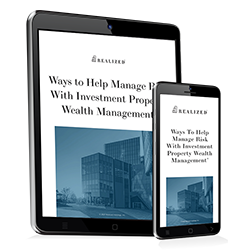
Real estate investing isn’t a simple process – we believe it requires strategic planning, knowledge of asset and market fundamentals, capital, experience with real property tax law, and oftentimes even a bit of luck.
Understanding important real estate terminology also can help increase your ability to analyze the viability of potential real property investments. This article discusses the difference between market risk and market volatility, two terms that sound alike but are very different from each other.
What is Market Risk?
Owning real estate exposes investors to many different kinds of risk, and your tolerance for risk largely determines your investment strategy. Although market risk in real estate can be classified in many different ways, the end result is the same: a loss of your investment capital.
Market risk has many different faces. In public investment markets, risk factors include rising interest rates, inflation, illiquidity, and other micro and macroeconomic factors that can lead to gains or losses. Market risk in real estate is a bit different. It includes factors such as population shifts, decreased demand for a particular asset class, asset oversupply, tax policy changes, unforeseen natural disasters, lower consumer spending, high unemployment, and similar factors that can lead to negative changes in cash flow, loss of capital, declining asset values, or any combination of all three.
What is Market Volatility?
In public investment markets, volatility is a period of steep price declines and gains. Securities are on the rise in a bull market and falling in a bear market.
Market volatility has a different context in commercial real estate investing. Real estate has historically experienced cyclical upturns and downturns that aren’t directly correlated to broader movements in public securities markets. Market volatility in real estate, therefore, is a measure of asset price stability over time and is directly tied to demand.
Real property assets that have seen dramatic historic price fluctuations across their lifespan can be considered volatile, while assets that have held their values or appreciated and provided consistent returns over time can be considered stable.
The Bottom Line
Quantifying volatility using the standard deviation method is an accepted practice for measuring risk in public market investments, but it may prove ineffective as a gauge for measuring risk in direct property investments due to the cyclical nature of real estate, a general lack of data across commercial asset classes, and the fact that most properties change hands infrequently.
Historically, commercial real estate has proven less susceptible to volatility; however, volatility exists within any real property or publicly traded investment. Similarly, the more you understand the various risk factors associated with an asset, the more you can implement a risk management plan that can help manage your exposure to real estate market risk.
This material is for general information and educational purposes only. Information is based on data gathered from what we believe are reliable sources. It is not guaranteed as to accuracy, does not purport to be complete and is not intended to be used as a primary basis for investment decisions. It should also not be construed as advice meeting the particular investment needs of any investor. Realized does not provide tax or legal advice. This material is not a substitute for seeking the advice of a qualified professional for your individual situation. All investments have an inherent level of risk. The value of your investment will fluctuate with the value of the underlying investments. You could receive back less than you initially invested and there is no guarantee that you will receive any income.



